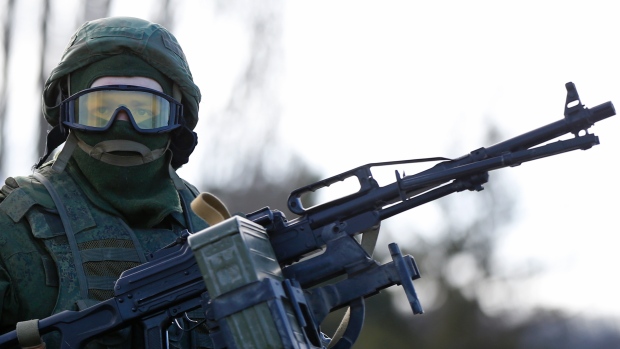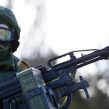
Obama Slaps Putin’s Hand in Crimea—to Little Avail
Publication: Eurasia Daily Monitor Volume: 11 Issue: 40
By:

The two telephone conversations between United States President Barack Obama and Russian President Vladimir Putin on March 2 and February 22 marked a dramatic deterioration of relations caused by the near-complete collapse of common ground in managing the crisis in Ukraine. The first discussion about the implementation of the crisis-defusing compromise reached in Kyiv turned out to be devoid of practical sense because President Viktor Yanukovych had to flee from rebellious Kyiv and go into hiding in Russia. Putin was obviously irked by such an outcome to the confrontation he had triggered when he forced Yanukovych to cancel the pre-scheduled signing of an association agreement with the European Union last November. And the Russian president’s irritation informed his decision to discontinue further financial aid to Ukraine and to launch large-scale military exercises near the country’s border (Nezavisimaya Gazeta, February 28).
This sort of reaction was more or less expected, but the West was completely unprepared for Russia’s even more provocative move of sending dozens of Spetsnaz (special forces) troops to take control of administrative building and the airport in Simferopol, the capital of the resolutely anti-Maidan Crimea (https://ej.ru/?a=note&id=24560). On Friday (February 28), Putin had a series of telephone conversations denying any wrongdoing to German Chancellor Angela Merkel, British Prime Minister David Cameron and President of the European Council Herman Van Rompuy (https://president.kremlin.ru/news/20350). Obama, however, had more than enough information about troop movements to see through those denials and so opted to deliver a stern warning about the “costs for any military intervention in Ukraine,” though stopping short of establishing the fact of a Russian projection of military power (https://ria.ru/world/20140301/997625391.html).
He probably wanted to leave Putin an opportunity to step back, but the enterprise of intervention was not to be stopped. Before the presidential motion for using military force in Ukraine was approved by the enthusiastic Federation Council, Russian troops had taken control over the central part of Simferopol (https://newsru.com/world/01mar2014/simferopol.html). The newly and dubiously appointed Crimean prime minister, Sergei Aksenov, made a formal appeal for Russian help even if nobody in Kyiv was contemplating any forceful measures for restoring control over the mutinous autonomy. The international and economic consequences of this exercise in dismembering a major European state are so predictably bad for Russia that the question about Putin’s motivations loom large.
President Putin’s animosity to the revolutionary uprising in Kyiv is so intense that it prevails over all pragmatic assessments of necessary measures aimed at stabilizing Russia’s most important neighbor. This antagonism is certainly rooted in fears about a possible Maidan revolution erupting in downtown Moscow—and translates into Putin’s obsessive desire to prove that nothing good could possibly come out of the “extremist” rebellion in Ukraine (or any other state for that matter) against the legitimate rulers, corrupt and despotic as they may be (https://www.gazeta.ru/comments/2014/02/28_e_5930577.shtml).
Such an ideological viewpoint could have been expected to result in a Kremlin policy of undermining and bankrupting the new authorities in Kyiv, but not necessarily of armed intervention. Instead, Putin pushed the Federation Council to approve the use of the Russian army in Ukraine, thus creating ex post facto domestic legitimacy for Russia’s already ongoing intervention abroad (https://echo.msk.ru/blog/svanidze_n/1270012-echo/). This uncharacteristically adventurous behavior may be partially explained by Putin’s bitter feelings of having been “cheated” by the EU and US with the deal that was presented as a compromise between Yanukovych and the Maidan—which turned out to be a mandate for the victory of the latter. His deep conviction that the “extremist riots” in Kyiv were directed and sponsored by the West was massively reinforced by the official propaganda that has produced a distorted impression among a majority of Russians (https://www.levada.ru/26-02-2014/rossiyane-o-sobytiyakh-v-ukraine-maidan). This induced public attitude is, in turn, generating strong political pressure to do something about the spectacular victory of “evil nationalists” in Kyiv. And that pressure makes it exceedingly difficult for Putin to pursue a calculated “wait-and-see” policy marked by measured trips and pushes that could have surreptitiously set revolutionary Ukraine on a downward spiral.
There is, however, a more existential and therefore a more dangerous explanation. It is possible that Putin sees Ukraine’s possession of Crimea as a grave historic injustice, which is rejected by the majority of the peninsula’s inhabitants and is profoundly offensive to the feelings of Russian patriots (https://echo.msk.ru/programs/beseda/1269352-echo/). The de-facto collapse of the Ukrainian state presents a unique opportunity to undo this injustice—and grants Putin a chance to become a historic leader who returned the Crimea to Russia (https://www.colta.ru/articles/society/2243). To accomplish such a historic mission, he needs to silence and sweep away those “traitors” who would challenge his authority to decide what is right for Russia—hence the unprecedented police zeal in throwing behind bars every protester in Moscow (Novaya Gazeta, February 25).
Putin’s readiness to act on the “historic opportunity” is based on the premise that the response from the West would be limited to hollow protestations and demonstrative gestures like canceling the G8 summit in Sochi scheduled for early June (https://echo.msk.ru/programs/code/1269316-echo/). This damage pre-assessment is informed by Russia’s experience of re-establishing “business-better-than-usual” relations with the West after the August 2008 war with Georgia and on Moscow’s conviction that the North Atlantic Treaty Organization’s (NATO) capacity to act was severely damaged by the defeat in Afghanistan and the economic crisis—and is yet to be proven wrong. One important difference with the Georgian war is that President Mikheil Saakashvili allowed himself to be manipulated by Moscow into providing the casus belli, while in Crimea no violent clashes have created even a flimsy pretext for sending the proverbial “limited contingent” of Russian troops. So Putin is executing an intervention of choice. The immediate risk here is that when a bloody incident is required, it usually happens.
Enraged by the Ukrainian revolution and blinded by a vision of “greatness,” Putin has boldly broken through the boundaries of international law, which he used to praise so highly. Obama now faces a difficult task of mobilizing every responsible world leader to ensure that the “outlaw” is treated accordingly. It will, however, be up to Russian society to rid itself of this delusion of “patriotism” and restore the good name of the country—in peace with Ukraine.




